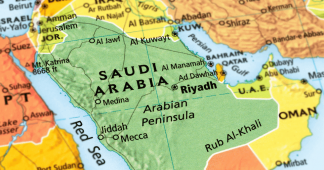By Joseph Kishore
US President Joe Biden will be traveling to Saudi Arabia later this month to visit with Crown Prince Mohammed bin Salman. A principal aim of the trip, which will include meetings with other Arab leaders and a trip to Israel, will be to strengthen broader support for the US-NATO war against Russia over Ukraine.
The New York Times, in its article on the subject, commented that it “represents the triumph of realpolitik over moral outrage, according to foreign policy experts.” On the part of the Times and the “foreign policy experts,” this was a polite way of addressing the undeniable hypocrisy of US claims to be defending “democracy” in Ukraine while courting one of the most brutal dictatorships in the world.
It remains to be seen whether Biden will broach the subject of Jamal Khashoggi, the Washington Post columnist who was brutally murdered on the orders of bin Salman in 2018, or if he will ask where Khashoggi’s dismembered body is located. It is even less likely that Biden will take the occasion to express his “moral outrage” over the execution of 81 prisoners on March 12, mainly political opponents of the blood-drenched Saudi regime.
The Biden administration has accused Russia of “war crimes” and even “genocide” in Ukraine, which, in the 100 days since the invasion on February 24 has killed an estimated 4,200 civilians, according to the United Nations. If the term “genocide” can be applied to a war taking place now, however, it would be the US-backed Saudi war against Yemen, which began in 2015 under the Obama administration.
Calculations of the casualties from the systematic bombardment and starvation of the impoverished country vary. However, the United Nations Development Programme issued a report in November 2021, seven months ago, that estimated 377,000 people had died. This is somewhat more than one percent of Yemen’s population of 30 million.
The UNDP estimated that more than 260,000 of those killed were children under the age of five, largely through hunger and disease produced by a Saudi blockade backed by the UAE and the United States. The report also estimated that the death toll will rise to 1.3 million by 2030, with 70 percent killed from the catastrophic social and economic impact of the war. The number of people living in extreme poverty is expected to rise to 22 million by 2030.
A separate report issued by the UN International Children’s Emergency Fund (UNICEF) in March found that 538,000 children in Yemen are already severely malnourished, but this is expected to soar to 2.2 million by the end of the year, in part due to sharply rising food prices throughout the world. UNICEF also estimated that more than 10,000 children have been directly killed or injured by bombs and other military actions since 2015.
The war has been characterized by repeated attacks on civilian infrastructure by the Saudi-led coalition. On January 21 of this year, an airstrike (reportedly using laser-guided missiles supplied by Raytheon) killed at least 82 and injured 266 at a detention center housing African migrants in Saada. The attack followed strikes against civilian buildings in the capital of Sanaa, including against a water treatment center that cut off 120,000 people from clean drinking water.
There was no condemnation in the US media at the time of Saudi “war crimes” against Yemen, nor were their howls of protest from the pseudo-left backers of US imperialism over the war crime. Two-and-a-half months later, however, a missile strike on a Ukrainian train station that killed 50—blamed, dubiously, on Russia—was seized on to demand a major intensification of US military support for Ukraine. This is “genocide,” Biden declared.
When he came to power in January 2021, Biden said that he would make the Saudi regime “pay the price,” particularly for the murder of Khashoggi, and that his administration would “make them in fact the pariah that they are.” He also made a vague declaration that his administration would end “American support for offensive operations” in the war against Yemen.
This, however, was entirely for show. Military weaponry has continued to flow into the country unabated. The US is the principal supplier of weapons to Saudi Arabia (accounting for 73 percent of arms imports, according to the Brookings Institution). Per the US State Department website, “Saudi Arabia is the United States’ largest foreign military sales (FMS) customer, with more than $100 billion in active FMS cases. Through FMS, the United States has supported three key security assistance organizations in Saudi Arabia—the Ministry of Defense, the National Guard, and the Ministry of Interior.”
That is, the US is not only supplying weapons used to bomb Yemen and enforce its economic blockade, but also to bolster its apparatus of domestic repression—the Ministry of the Interior is the body responsible for executions.
In anticipation of Biden’s trip, the administration is working to reformulate its official appraisal of the Saudi regime. As recently as this week, the White House affirmed the previous statement that Biden considered bin Salman a “pariah.” However, on Thursday, White House press secretary Karine Jean-Pierre praised Saudi Arabia for “helping consolidate” a temporary truce in Yemen, that is, to put a partial pause on the bloody carnage it has led with the backing of American imperialism.
Beyond Russia, the US will discuss with Saudi Arabia a renewed US and Israeli offensive against Iran. It is also seeking Saudi agreement to increase oil production, as the American ruling class confronts a mounting wave of social anger within the country over the soaring costs of gasoline and other consumer goods. The meeting, according to Secretary of State Antony Blinken, will address “the totality of our interests in that relationship.”
The naked hypocrisy of US imperialism, we can rest assured, will not stop the upper-middle-class moralists in the media and academia from giving their full support for the imperialist crusade against Russia, waving the tattered and bloody banner of “human rights.”
We remind our readers that publication of articles on our site does not mean that we agree with what is written. Our policy is to publish anything which we consider of interest, so as to assist our readers in forming their opinions. Sometimes we even publish articles with which we totally disagree, since we believe it is important for our readers to be informed on as wide a spectrum of views as possible.











